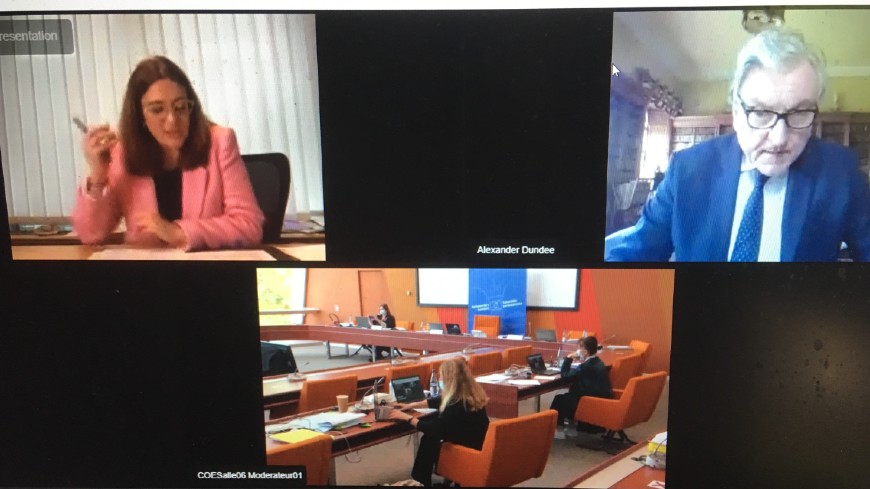On 28 May 2021, the Standing Committee of the Parliamentary Assembly (PACE) debated the report by Lord Alexander Dundee (United Kingdom, EC/DA) on Humanitarian action for refugees and migrants in countries in North Africa and the Middle East. Lord Dundee noted with deep concern the serious humanitarian situation of refugees, migrants and internally displaced persons in many countries in North Africa and the Middle East, which were a prime transit region for migrants and asylum seekers heading towards Europe, many of whom risking their lives on the Mediterranean Sea or in dangerous transit countries. The report calls for close co-ordination of humanitarian assistance among European donor countries and receiving countries and appreciated the central role of the United Nations Office for the Coordination of Humanitarian Affairs. A parliamentary dimension should be ensured in all decisions concerning the provision of humanitarian assistance for migrants and refugees.
On 25 May 2021, the Sub-Committee on Migrant Smuggling and Trafficking in Human Beings of PACE, held an exchange of views with Ms María Soraya Rodríguez Ramos, Chairperson of the Delegation for relations with the Pan-African Parliament, Member of the EU Parliament; Mr Valiant Richey, OSCE Special Representative and Co-ordinator for Combating Trafficking in Human Beings, Vienna; Mr Ilias Chatzis, Head of the Human Trafficking and Migrant Smuggling Section, UN Office of Drugs and Crime, Vienna; Mr Sabelo Mbokazi, Head of Labour, Employment and Migration, Department of Social Affairs, African Union Commission, Addis Ababa, Ethiopia; and Ms Katarina Lughofer, Programme Manager for Asylum and Migration, EU Agency for Fundamental Rights, Vienna. The objectives of this exchange were to achieve greater awareness, closer cooperation and a stronger parliamentary dimension, which will determine future action. Previously, the Sub-Committee had an exchange of views with Helga Gayer, President of the Group of Experts on Action against Trafficking in Human Beings (GRETA) and Jesper Hjortenberg, Chairperson of the European Committee on Crime Problems (CDPC) at its last meeting,
From 10-12 May 2021, the Ad hoc Sub-Committee of the Committee on Migration, Refugees and Displaced Persons of PACE, visited Greece to look into the situation of refugees and migrants after the destruction by fire of the Moria camp in Lesvos island. The Committee met with representatives of civil society, UNHCR, ICRC, the relevant parliamentary committee and the representatives of different ministries.
Due to the Covid-19 pandemics the number of arrivals of migrants had significantly fallen, however safe access to the Greek territory became a problem due to strict border controls. There were approximately 119,300 asylum-seekers in Greece at the end of January 2021. While the situation on mainland was now better, most of the 14,000 asylum-seekers at the reception centres on the islands were exposed to various risks. A major problem faced was the non-respect of the EU-Turkish agreement on irregular migrants. Concerns were expressed by the NGOs met by the delegation regarding the length of asylum procedures, which sometimes lasted two years. More than 18,000 asylum claims were pending. Another important concern was the absence of integration programmes for refugees. Children in the centres were not provided with schooling, only non-formal education.
It was also reported that 1,500 people were reported dead or missing while crossing the Aegean Sea or Evros since 2015, among them 528 minors. The identification procedure was very complicated due to the absence of a unified system. As regards the practice of detaining migrants before their removal, some progress was made in training special staff to work in the centres.
A positive development, was the relocation of 745 unaccompanied and separated migrant children to other European countries and the adoption of legislation forbidding the detention of migrant children.
During the visit to Lesvos, in particular its Mavrovouni temporary reception and identification centre, the members of the Committee had discussions with refugees living in the centre, the Head of the Sub-office of the UNHCR and the local authorities. Around 6,000 people reside in the centre, the majority coming from Afghanistan, Congo and Syria. People were complaining about the food, unstable tents and very poor hygienic conditions. They also complained of having to wait too long to receive a reply to their asylum claims and the lack of money to pay for the documents needed.
As a follow up to the visit, the Committee on Migration, Refugees and displaced persons decided at its meeting on 25 May 2021 to ask the Bureau of the Assembly to hold a current affairs debate on the necessity of effective solidarity mechanism between European countries to relieve the pressure on front-line border countries.



